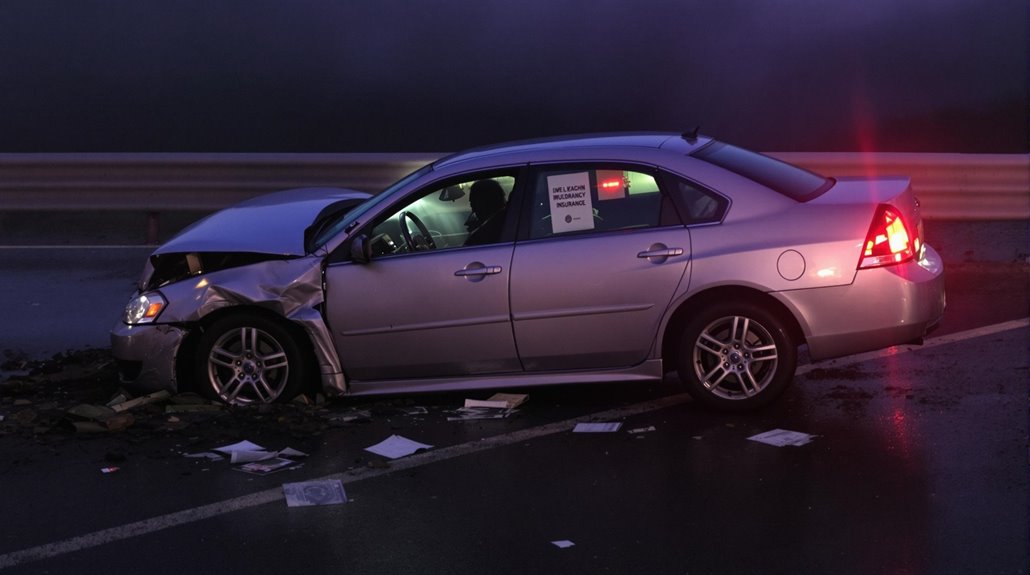In a car accident, make safety first. Check for injuries and call 911 if necessary. Leaving the scene can cause legal problems, so stay. Always report the accident to the police, even if state laws don’t require it, to support your insurance claim. Gather all parties’ details and document everything with photos. Contact your insurance within 72 hours to start the claim process. Further guidance will improve one’s understanding of the procedures involved.
Key Takeaways
- Call 911 immediately to report the accident and ensure official documentation by emergency services.
- Move vehicles safely to the side of the road to prevent further accidents.
- Exchange information with other drivers, including contact and insurance details.
- Take photos of vehicle damage, road conditions, and the accident scene.
- Notify your insurance company within 72 hours to ensure proper claim processing.
Immediate Safety Measures

In the moments following a car accident, immediate safety measures are essential. Ensuring physical safety is the first priority. Check for injuries and call 911 if needed. Move vehicles to the side if possible. Turn on hazard lights to warn other drivers. Use cones or flares for extra visibility. Staying safe helps prevent further accidents and reduces negligence claims. Liability insurance may become important if negligence law is involved. Securing the scene is critical. Avoid additional harm by moving to a safe spot. Keep calm to think clearly. Do not admit fault. Use safety tools like flares and first aid kits. These steps help manage the situation effectively and align with insurance and legal requirements.
Reporting the Accident
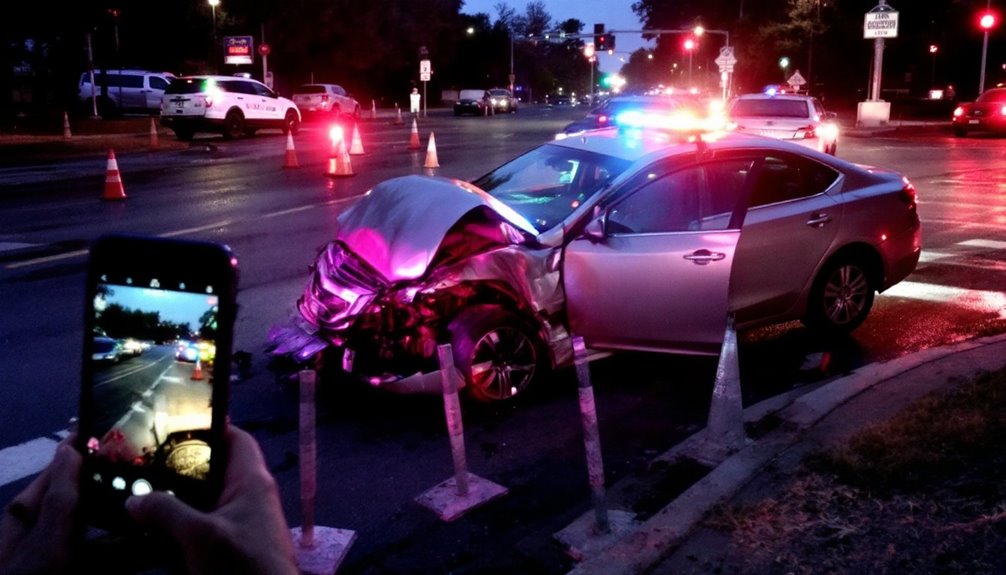
After a car accident, it is important to contact emergency services right away. Providing accurate details about the incident is vital for authorities to assess the situation. Obtaining a copy of the police report is essential for insurance purposes and any future legal matters.
Contact Emergency Services Immediately
A car accident can be a chaotic event, and immediate action is essential. It’s critical to contact emergency services without delay. Reporting the accident guarantees that law enforcement and medical teams are dispatched quickly. This is especially important if injuries are present. Even if injuries are not obvious, it is wise to seek medical attention. Some injuries become apparent only later.
Remaining at the scene is vital. Law enforcement will document the incident, pivotal for insurance claims.
- Call 911 immediately after the accident.
- Move to a safe location if possible.
- Turn on hazard lights to signal other drivers.
- Stay calm and wait for emergency personnel to arrive.
These steps help protect everyone involved and make certain of proper accident handling.
Provide Accurate Incident Details
Prompt reporting of a car accident is essential for an accurate account of events. After a crash, one should report the accident to the police promptly. This facilitates an official investigation and report. In South Carolina, accidents with over $1,000 damage, injuries, or fatalities must be reported. If police are not present, complete Form-309 for the SCDMV. Documenting the accident scene is important. Take photos and videos of vehicle damage and surroundings. Collect witness details and vehicle information. Gather insurance information from all parties involved. Maintaining and organizing evidence is necessary. Store copies of all documents, including the police report and medical records. Accurate and thorough documentation helps in dealing with insurance claims efficiently.
Obtain Police Report Copy
To effectively handle a car accident, obtaining a police report copy is essential. The police report is important for protecting legal rights and supporting insurance claims. It provides an official account of the incident and may include details like citations, photographs, and witness statements. Obtaining this report can be done online, by mail, or in person from the California Highway Patrol or local police department.
- Submit CHP 190 Form: Complete the required form for release of information.
- Provide Identification: Include a photocopy of a driver’s license or ID card.
- Pay Necessary Fees: Fees vary; check the relevant department’s website for details.
- Obtain Case Number: This aids in processing the request efficiently.
The police report plays a significant role in legal and insurance matters.
Gathering Information
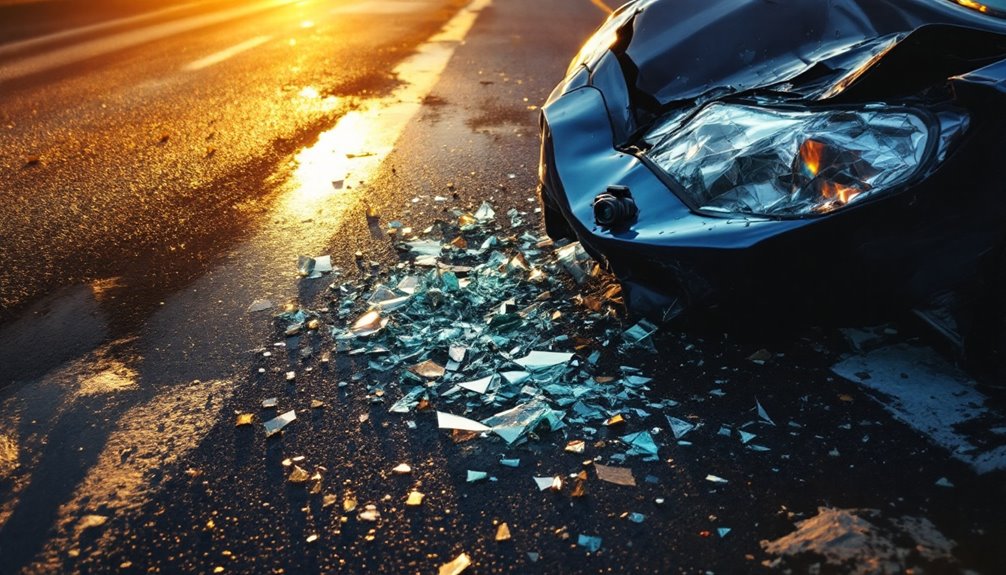
After a car accident, gathering information is vital. Collect essential details from all drivers, including names, contact information, and insurance details. Obtain witness contact information and statements to support your claim.
Essential Driver Details
Thoroughness is key when gathering essential driver details after a car accident. Collecting driver and vehicle information is vital. This includes the full name, contact information, driver’s license number, and vehicle details such as make, model, and license plate. Insurance and policy details are essential. Obtain the insurance company name, policy number, and coverage type. Documentation and reporting are necessary for future reference. Capture photos or videos of the scene and note any statements made.
- Gather full names and contact information of drivers.
- Record driver’s license numbers and vehicle registration.
- Note insurance company names and policy numbers.
- Take photos or videos of vehicle damage.
This information helps make certain accurate reporting and smooth insurance claims.
Witness Information Collection
Gathering witness information is a vital step after a car accident. Identifying potential witnesses can strengthen personal injury settlements. Focus on those who directly observed the incident, like bystanders or other drivers. Consider pedestrians or cyclists for unbiased perspectives. Witness statements are essential pieces of evidence. Approach witnesses politely and ask if they can provide a statement. Collect their contact information, such as names, phone numbers, and emails. Ask open-ended questions to get detailed accounts. Document their statements accurately using a recording device or written notes. Pair these statements with other evidence, like photos and police reports. For legal advice and professional handling, consider consulting a personal injury attorney to guide the process effectively.
Documenting Evidence
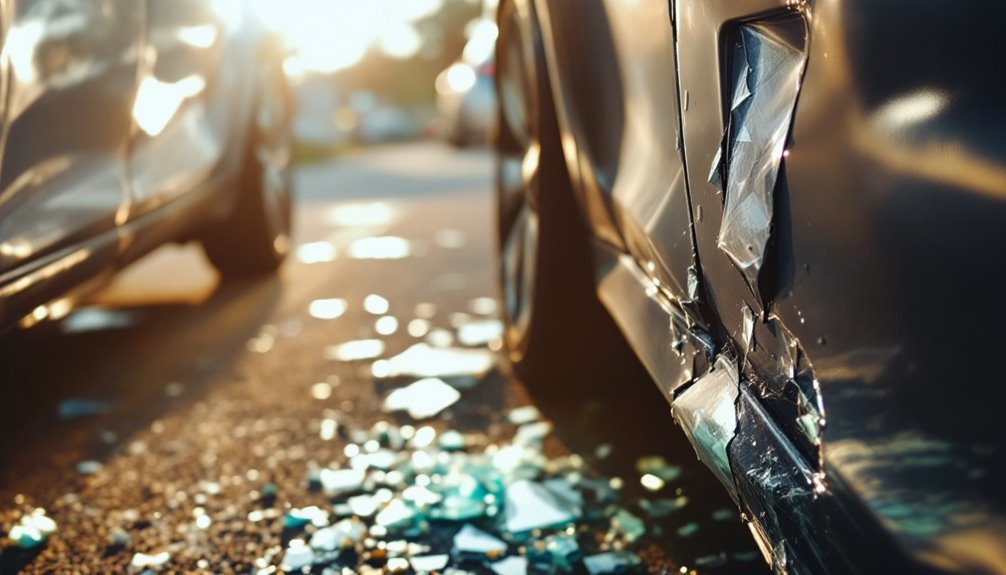
Documenting evidence is crucial in the aftermath of a car accident. It helps in insurance claims and legal disputes. Start by taking photographs of the accident scene. Capture clear images of vehicle damages, skid marks, road conditions, and traffic signs. Weather conditions can also be important. Next, make certain a police report is filed. Contact law enforcement to create an official record. This report provides a neutral account of the accident.
Make certain the following steps:
- Obtain a copy of the police report for accuracy.
- Record any citations or violations noted in the report.
- Document all injuries with photos and medical records.
- Keep detailed records of vehicle damage and repair costs.
These actions can protect against unfair insurance outcomes.
Notifying Insurance Companies
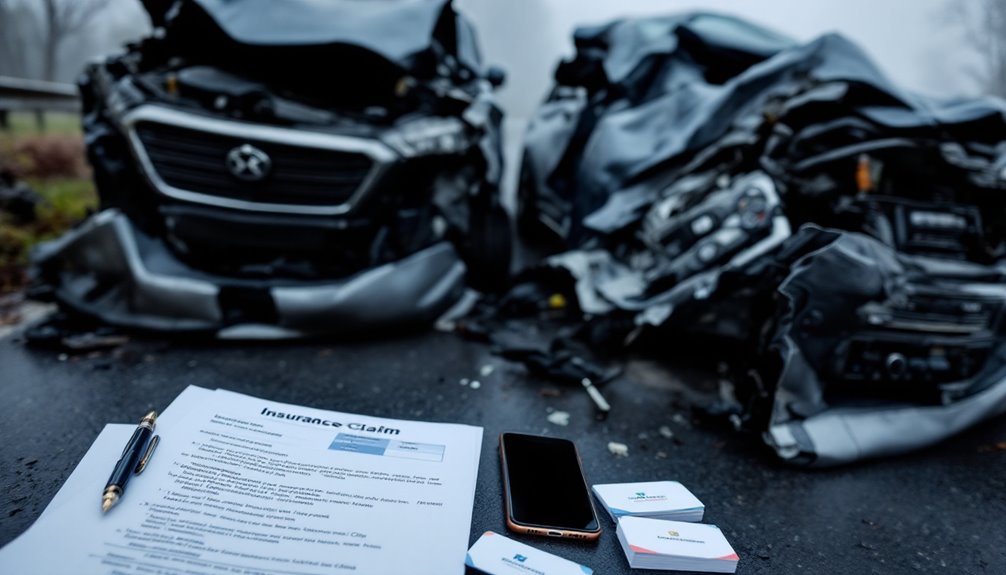
Prompt notification is key after a car accident. Notifying insurance companies quickly, ideally within 72 hours, is essential. Timely reporting helps guarantee claims are processed smoothly. It reduces the risk of complications or coverage denial. Each policy may have different deadlines, so it is important to check specific terms. Even minor accidents should be reported to cover unforeseen issues. When notifying the insurer, provide basic information: accident date, time, location, involved parties, and insurance details. A police report number and a detailed accident description, including injuries, should be included. Compliance with policy requirements is vital. Failure to report promptly can lead to denied claims and loss of coverage for damages. Policy compliance is necessary for protection.
Legal and Administrative Steps
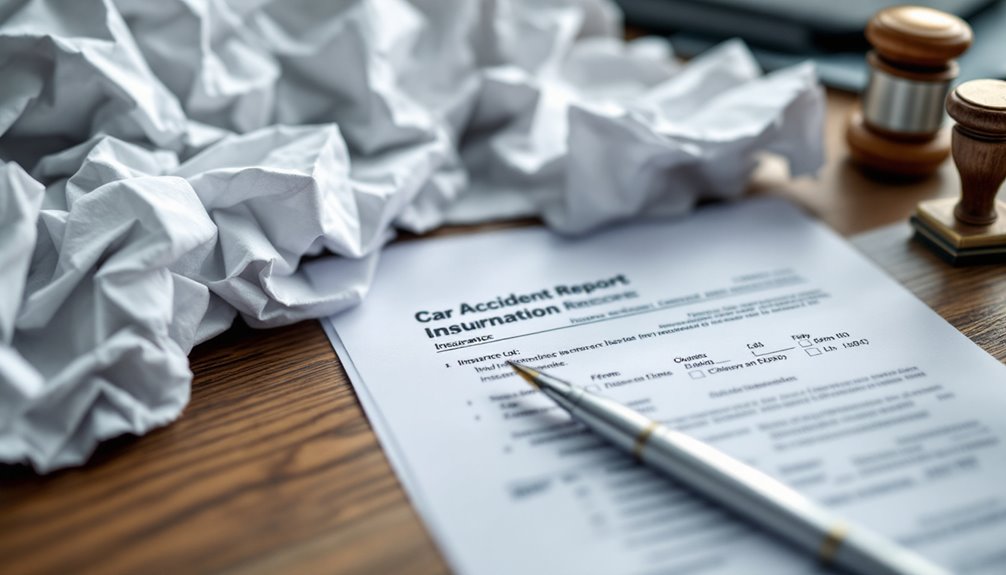
When handling a car accident, understanding the legal and administrative steps is essential. First, gather evidence. Take photos of the scene, vehicle damage, and road conditions. Collect information from other drivers, like names and insurance details. Document everything, including all communications with insurance companies. Identify witnesses and preserve physical evidence like damaged car parts. If an insurance claim is denied or unsatisfactory, consider filing a civil lawsuit. This could lead to a judge’s decision or settlement. In severe cases, wrongful death lawsuits may arise.
Key steps include:
- Gather Evidence: Photos, documents, and witness information.
- Filing a Civil Lawsuit: If claims are denied or low offers are made.
- Preserve Evidence: Keep all physical and digital records.
- Consider Legal Action: Especially in wrongful death scenarios.
Seeking Medical Attention
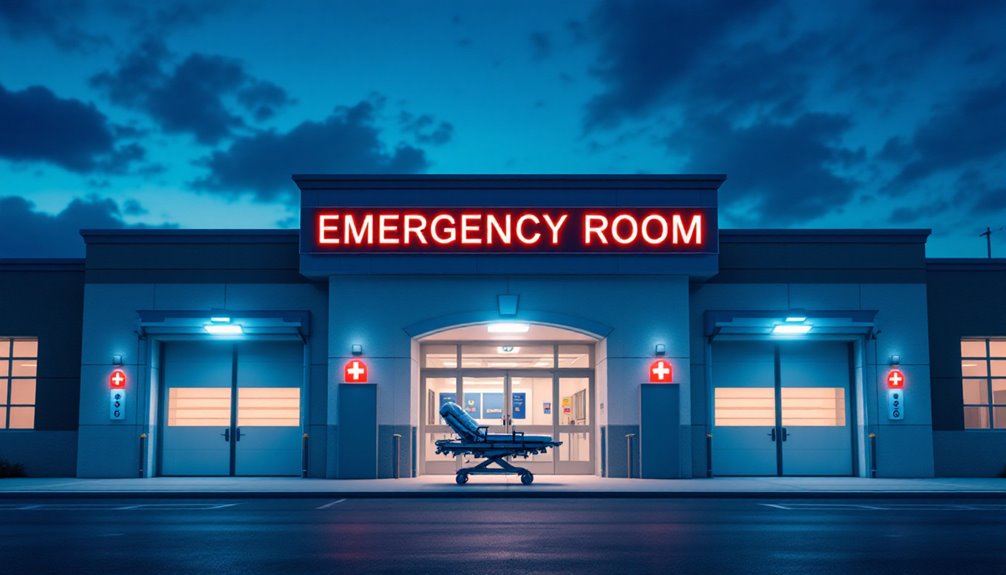
Immediate medical attention is essential after a car accident. It guarantees that both visible and hidden injuries are diagnosed and treated promptly. This prevents minor injuries from becoming severe. Latent issues like concussions or internal bleeding may not be obvious right away. Seeking medical care helps document injuries, creating an official medical record. This documentation is critical for insurance claims and legal proceedings, linking the accident directly to injuries. Delayed symptoms, such as whiplash, can emerge days later, complicating recovery. Early treatment prevents long-term health issues. Medical records serve as neutral evidence, supporting claims and legal documentation. Consistent medical care guarantees proper healing and thorough records, aiding in recovering damages from insurance companies effectively.
Understanding Insurance Policy Coverage
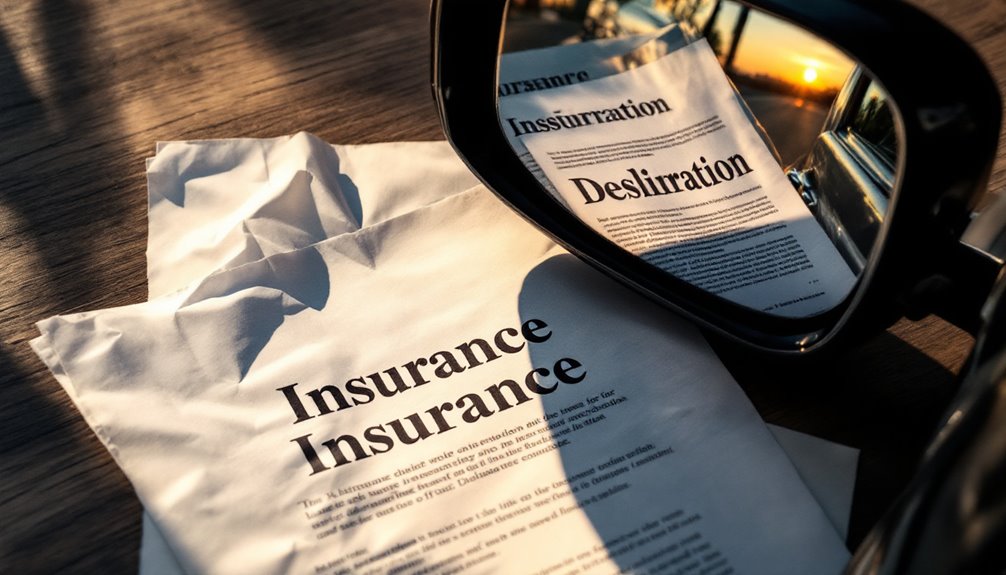
After addressing medical needs, understanding insurance policy coverage is the next step. It is essential to know what is covered under your policy. Liability coverage is mandatory in most states. It covers injuries and damages you cause to others. Collision and thorough coverage are optional. Collision covers damage from crashes, while thorough coverage covers non-collision events like theft or weather damage. Knowing these can help make informed decisions.
- Liability Coverage: Required by law in most states.
- Collision and Thorough: Optional but often needed for financed cars.
- Uninsured and Underinsured Motorist Coverage: Protects against drivers lacking sufficient insurance.
- Additional Coverages: Includes options like Personal Injury Protection and roadside assistance.
Understanding these coverages guarantees better preparedness after an accident.
Communicating With Insurance Adjusters
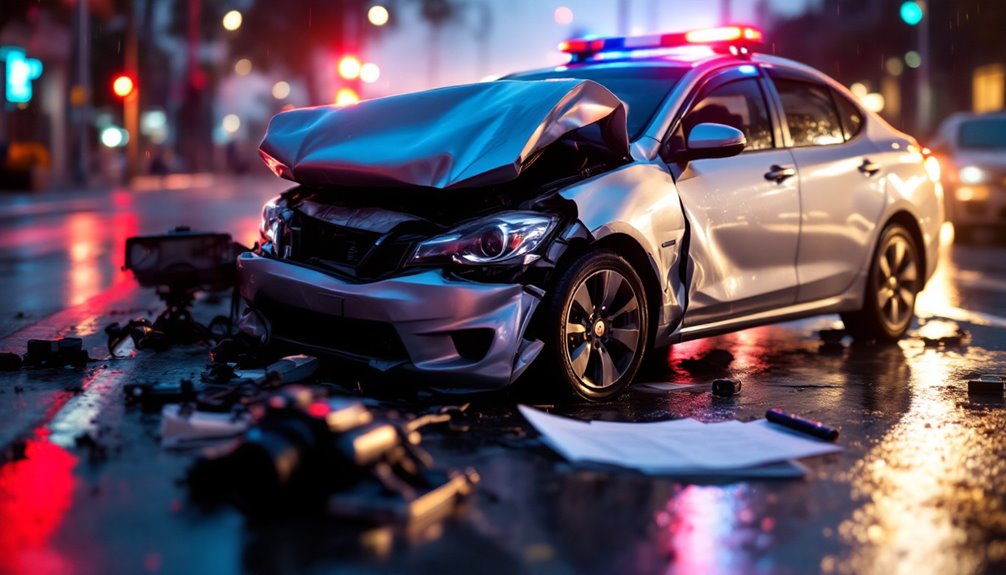
When communicating with insurance adjusters, it is important to provide accurate information. This guarantees that the claims process goes smoothly and helps avoid misunderstandings. Understanding the policy coverage is essential, as it allows individuals to know what is covered and what is not.
Provide Accurate Information
A critical step in managing a car accident claim is providing accurate information to insurance adjusters. This means giving accurate details about the accident from the start. Documenting damages is important for a valid claim. The following information should be shared:
- Accident Details: Date, time, and location.
- Involved Parties: Names and contact details.
- Witnesses: Collect and provide their information.
- Accident Description: Clear and factual, no speculation.
Communicating effectively with adjusters helps in processing the claim smoothly. It’s essential to be honest but concise. Avoid any unnecessary details that might complicate the case. Photos of damages and written records strengthen the claim. Accurate information protects one’s rights and helps avoid misunderstandings with the insurance company.
Understand Policy Coverage
Understanding policy coverage is essential when dealing with insurance adjusters after an accident. Policyholders must know the types of coverage they have, such as Property Damage Liability or Personal Injury Protection. This knowledge helps in facing insurance adjuster tactics, like minimizing payouts. Adjusters often aim to downplay injuries and damages. Recognizing these tactics can prevent policyholders from getting shortchanged. Being well-informed allows policyholders to challenge inaccurate assessments and negotiate fair settlements. Additionally, implementing a retraction policy within claims discussions can help correct any misstatements that might undervalue a claim. By staying proactive and documenting all communications, policyholders can strengthen their position against unfair insurance practices.
In legal disputes, understanding coverage like Uninsured Motorist or Bodily Injury Liability is important. These coverages protect against drivers with insufficient insurance and cover injuries to others, respectively. Being aware of these elements helps in handling claims. Legal counsel can protect that the policyholder’s rights are safeguarded. Proper understanding of one’s policy coverage aids in fair settlements and effective communication with insurance companies.
Handling Hit-and-Run Situations
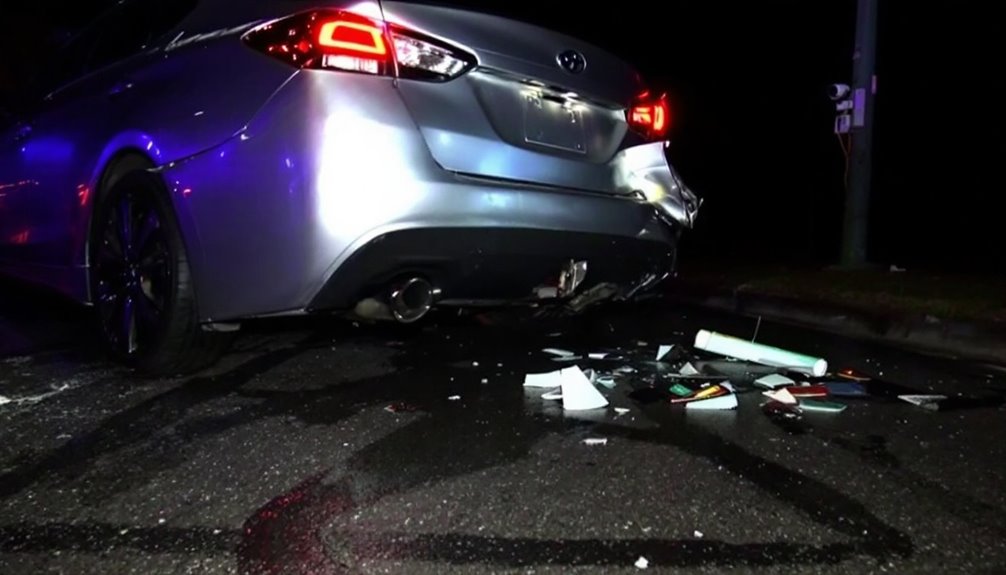
In the unfortunate event of a hit-and-run, safety is the top priority. Move to a secure location if possible. Once safe, start documenting the scene. Take photos of the damage and the surrounding area. Collect information from any witnesses. Reporting the accident to law enforcement is vital. Obtain a copy of the police report for your records.
Notify your insurance company promptly. Provide all documentation to facilitate the insurance claims process. Consider these essential steps:
- Document the scene with photos and witness details.
- Report the accident to police and obtain a report.
- Contact the insurance company with all collected evidence.
- Follow up on the claims process regularly.
Consulting With a Lawyer
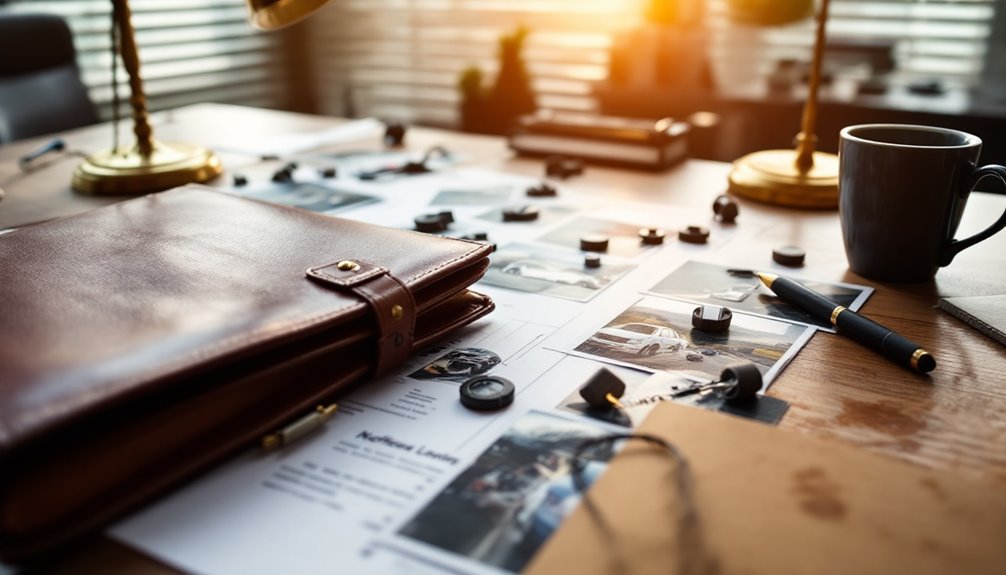
Engaging a lawyer’s expertise early in the car accident process can safeguard one’s rights and maximize potential compensation. A lawyer helps navigate the legal complexities of a claim. They validate that important deadlines, like the statute of limitations, are met. Legal representation is essential in dealing with insurance company tactics. Lawyers handle communication with adjusters and can counter lowball offers. They prevent clients from making harmful statements. An attorney evaluates the true worth of a claim, considering medical costs and lost wages. They manage all paperwork and filings accurately. If needed, they provide representation in court. Lawyers utilize their skills to negotiate fair settlements, using evidence and expert analysis to strengthen the case against insurance companies.
Frequently Asked Questions
How Can I Minimize the Impact on My Insurance Premiums After an Accident?
To minimize the impact on insurance premiums after an accident, one can consider switching insurance companies to find better rates. Comparing quotes is essential. Adjusting coverage and deductibles can also help lower costs. Utilizing accident forgiveness programs and maintaining good driving habits are beneficial. Improving credit scores and exploring available discounts, like those for safe driving or installing safety features, can further reduce premiums. Careful planning is key.
What Steps Should I Take if the Other Driver Is Uninsured?
In the storm of a car accident, discovering the other driver is uninsured can feel like lightning striking twice. First, contact the police to document the incident. Gather evidence—photos and witness details. Notify your insurance and file an uninsured motorist claim. Seek medical care for any injuries. Keep all records organized. Consider consulting a lawyer for guidance. These steps can help navigate the turbulent aftermath with more control and security.
How Do I Handle Situations Where the Police Report Is Inaccurate?
When the police report is inaccurate, one should promptly contact the local police department. They should speak with the investigating officer to correct factual errors using proper documentation. Subjective errors are harder to fix. Presenting clear evidence might help. If errors remain, gathering independent evidence can support one’s claim. A car accident lawyer can assist in resolving disputes and verify that core facts are accurately reflected in the claim process.
What Can I Do if the Insurance Company Denies My Claim?
Approximately 50% of car insurance claims are initially denied, leaving many frustrated. When a claim is denied, one should contact their insurance for assistance. Document the scene and gather evidence. Review the denial and appeal through the state’s insurance department. Hiring a personal injury attorney can be beneficial. Avoid delays in filing and make certain accurate information is given to insurers. Understanding one’s policy helps in managing these challenges effectively.
How Should I Prepare for Potential Court Proceedings Following an Accident?
To prepare for court proceedings, one should understand the case details and consult with a lawyer. Gather evidence like photos, medical records, and repair estimates. Know courtroom procedures to reduce stress. Anticipate questions from all parties involved. Calculate total damages accurately. A clear, consistent account of events is vital. Being organized and informed will help in presenting the case effectively and achieving a favorable outcome.
Conclusion
In a twist of fate, as John pondered the steps from the guide, his phone rang. It was a friend who had just been in a car accident. Coincidentally, John had just become well-versed in handling such situations. He calmly shared the steps: assess, report, gather information, and notify insurance. His friend felt relieved, knowing he had the right guidance. This chance encounter highlighted the importance of being prepared, turning an intimidating situation into a manageable one.
